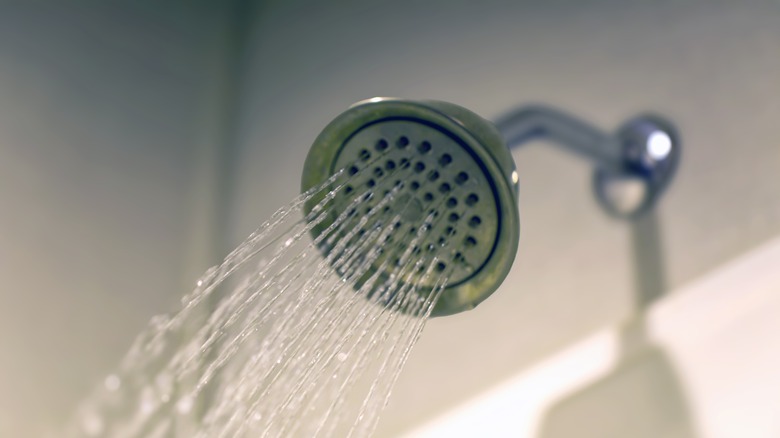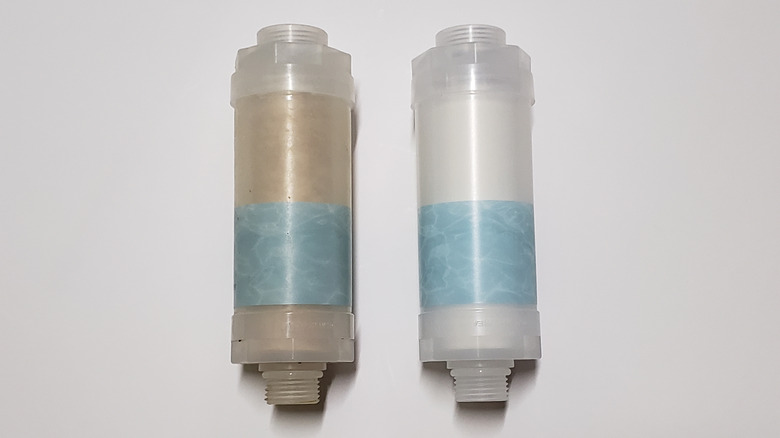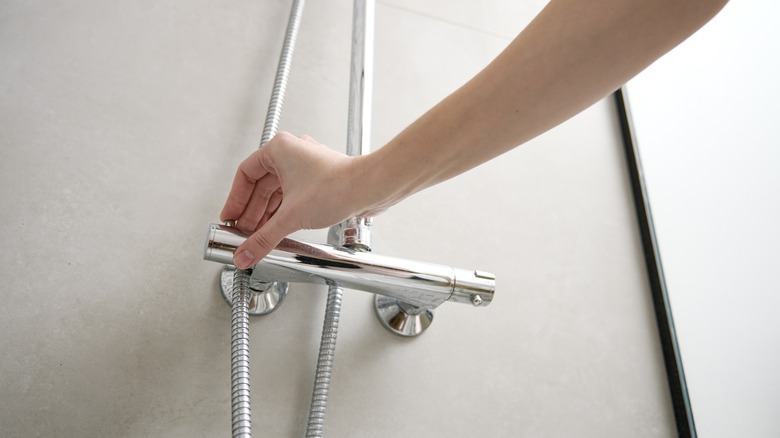Why A Shower Head Filter May Not Be The Solution To Your Problems
You can have the fanciest drinking water filter in the world, but unless it's a whole-house water filtration system, the water you use to bathe still contains the full range of contaminants from your water supply. If that concerns you, you're not alone —showerhead filters have been making the rounds on social media for years with no signs of letting up. They promise to solve all your skin and hair problems, but a closer look at the details reveals that these filters have important limitations.
The list of claims from showerhead filter companies is impressive. From removing chlorine to changing the pH of the water, they tout a seemingly endless stream of benefits that supposedly lead to smoother skin and softer hair. Whether they come through on those promises, though, depends on the answers to a few questions. First: What's in your water? Contaminants can vary widely by municipality and even household. Second: Will removing those specific contaminants achieve what you hope, like curing your eczema, dandruff, or acne? And last: Do these filters really remove those contaminants? Even if the company says so, none have yet received the third-party certifications that are standard in the water filter industry, so it's often not totally clear. By answering each one of these questions, you'll get a better sense of whether shower head filters are worth buying for your household or a waste of money.
Does your shower need filtering?
Let's start by tackling the first question. The majority of US households get water from public water systems, which are required to meet federal standards. But most water systems still contain contaminants of some kind, including heavy metals and PFAS. Chlorine, which is commonly used as a water supply disinfectant, often remains in the form of harmful byproducts. The only way to know for certain what's in your tap water is to test it, which isn't cheap; you can also research your water source with the Environmental Working Group to find out the top contaminants.
Health concerns about unfiltered water are well-founded. But showerhead filters are typically marketed more for addressing skin and hair issues, with an emphasis on removing chlorine and heavy metals, and the evidence there is more dubious. It's not clear how chlorine affects common skin conditions like eczema, for example. Other water contaminants, like microbes, could potentially lead to clogged pores and acne. Anecdotally speaking, many people who use a showerhead filter do notice a positive difference in their hair and skin. But your own issues could have many other root causes aside from your water.
Some customers buy water filters in hopes of battling hard water, which affects 85% of the US and has a more certain impact: By leaving mineral deposits, it can make it more difficult to get surfaces clean, as well as weaken and damage hair, and increase your risk of eczema. Unfortunately, showerhead filters don't soften water, which leads us to question number three: What can showerhead filters actually remove?
Are showerhead filter claims real?
Many popular showerhead filters use copper-zinc as the filter material, which reduces chlorine and heavy metals. Some also include additional filters with promises to remove many more contaminants, from microplastics to pesticides. However, water filters are not federally regulated. Companies typically seek certification from third-party testers like the NSF, helping customers verify that the products fulfill their claims, but no showerhead filter brand has done that yet. Many cite "third-party tests" on their websites and reference the NSF's standards despite not having certifications. That's just one example of misleading marketing among showerhead filter brands.
Many dermatologists and hair stylists still recommend a showerhead filter as one component in a healthier skin and hair regimen. Others are skeptical due to the lack of clear data. Before you shop, research your water supply and talk to a health professional to determine whether your skin and hair may benefit from filtering out certain contaminants. A showerhead filter likely won't hurt anything, even if it doesn't cure all of your problems, but it is an ongoing expense since you have to replace your showerhead filter regularly.
If you opt to buy one, look for a brand that shares at least some sort of data on its claims, like Filterbaby, which is pursuing NSF certification. One with multiple filters is best. But if your only goal is softer water, don't bother with a filter; get a water softener instead, or just cleanse your hair more often with a clarifying shampoo.


